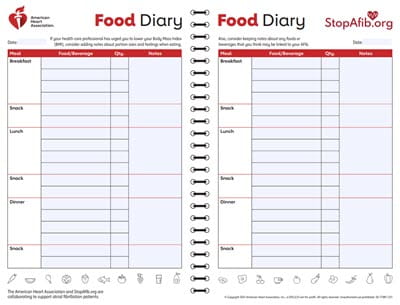Lifestyle Strategies for Atrial Fibrillation
Quick Facts
- You can make heart-healthy choices to help prevent problems caused by atrial fibrillation (AFib).
- If you have AFib, there are steps you can take to reduce the risk of stroke.
What can I do to reduce my risk for AFib?
To lower your risk for getting atrial fibrillation, also called AFib or AF, it’s best to maintain a heart-healthy lifestyle. View an animation of atrial fibrillation.
What can I do to lower my risk of problems caused by AFib?
If you have been diagnosed with AFib, take medications if they are prescribed for you. Also, get proper treatment for your condition to help prevent problems that can be caused by AFib.
Life’s Essential 8 are health behaviors and factors for improving heart health. These actions help lower the risk of heart disease and keep your circulatory system in the best condition:
- Get regular physical activity
- Eat a heart-healthy diet low in salt, saturated fats, trans fats and cholesterol
- Manage high blood pressure
- Avoid excessive amounts of alcohol and caffeine
- Don’t smoke
- Control cholesterol
- Maintain a healthy weight
- Get healthy sleep

View: Food Diary (PDF) | Spanish (PDF)
Other conditions may need treatment because they can contribute to AFib, including:
- Obesity
- High blood pressure
- Diabetes
- Sleep apnea
- Other heart conditions (heart attack, heart valve disease or heart failure)
- Thyroid disease (hyperthyroidism)
- Chronic lung disease
What can I do to reduce my risk for stroke?
A person with untreated AFib has up to a five times greater risk of stroke than a person without AFib.
Get treated
It is very important to treat AFib to reduce your risk for stroke.
Know your other risk factors
Other stroke risk factors include:
- A history of high blood pressure
- Increased age
- Previous stroke or transient ischemic attack (TIA)
- Diabetes
- Heart disease
- Family history
- Obesity
- Smoking
Commit to a heart-healthy lifestyle
The good news: You can lower your risk by making healthy lifestyle changes and treating your medical conditions as instructed.
Access our patient information sheets on how to live a heart-healthy lifestyle.
Video: John Criswell's AFib story







